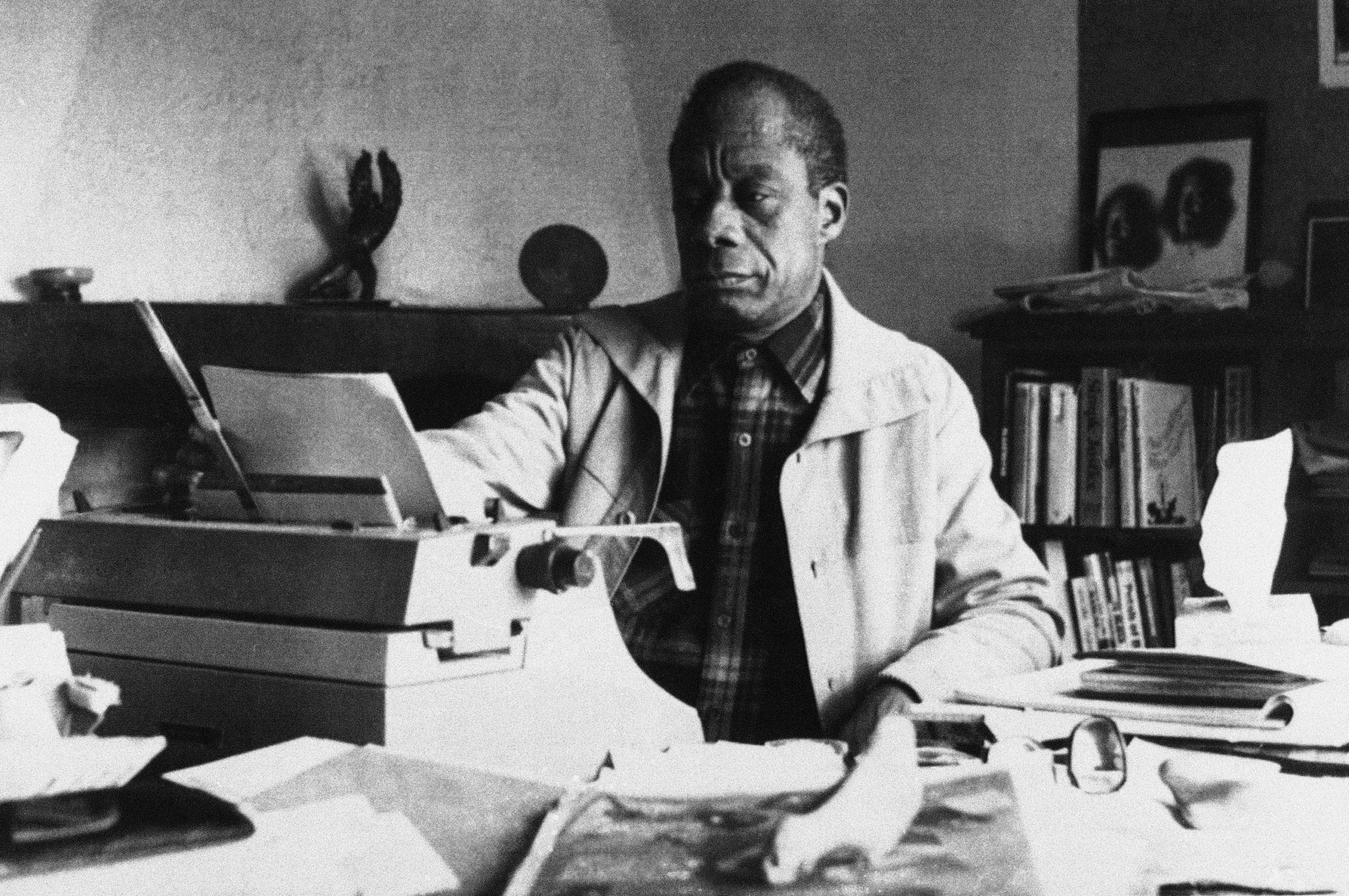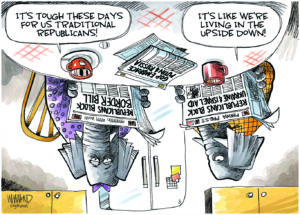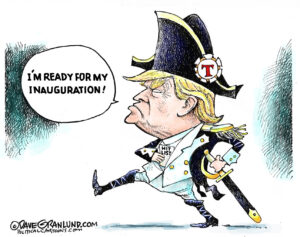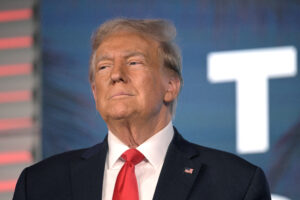William F. Buckley Never Fooled James Baldwin
The conservative author often shared the same goals as white supremacists—a reality that was not lost on his greatest intellectual rival. James Baldwin at his home in Saint Paul de Vence, France, in 1983. (Pressenia / AP)
James Baldwin at his home in Saint Paul de Vence, France, in 1983. (Pressenia / AP)
The following is an excerpt from Nicholas Buccola’s “The Fire Is Upon Us.” Listen to Truthdig Editor-in-Chief Robert Scheer’s interview with Buccola here.
By mid-1968, James Baldwin’s hope was in a precarious state. Just three months earlier, Martin Luther King Jr. was gunned down by a white supremacist in Memphis, Tennessee. “Since Martin’s death,” Baldwin explained later, “something has altered in me, something has gone away.” That “something,” he confessed, was his faith that people can be better than they are. King’s death “forced me,” Baldwin wrote, “into a judgment concerning human life and human beings which I have always been reluctant to make.” Baldwin had spent decades trying to convince people to treat one another as “miracles” despite “the disasters” they had become, but after King’s death he was finding it difficult to heed that advice. It would be too much to say that the bullet that murdered King also killed Baldwin’s hope, but it is fair to conclude that the event led him to undergo a radical transformation as a thinker and artist. Like all the other bloody moments in the history of the civil rights struggle, Baldwin’s focus was not on the perpetrator of the crime but instead on the circumstances that produced him and led his life to intersect with King’s. The moral corruption of a country that could produce this event, he thought, was beyond question. Baldwin had done all he could to avert the fire next time, but he was now accepting that the fire was upon us, and there was much that deserved to burn.
In the days and weeks after the King assassination, William F. Buckley Jr. was appalled. What upset him was not the murder itself—horrific though it was—but rather the reaction to it. In an attempt to “atone for the crime against Martin Luther King,” Buckley lamented, Americans were blaming themselves. In a speech to the American Society of Newspaper Editors called “Did You Kill Martin Luther King?” that Buckley delivered just two weeks after the assassination, his thesis was clear: those who, like Baldwin, thought the death of King revealed the corruption of the American soul were saying something that was “philosophically dangerous.” By asking Americans to reflect on their complicity in King’s death, Buckley declared, Baldwin and his ilk were simply coming up with another way to promote their “Hate America” message. In the wake of these criticisms, Buckley said that moments like these made him swell with pride for his country. The big story, he argued, was not the alleged moral corruption that led to such an event but instead “that we bred the most widely shared and the most intensely felt sense of grief ” in response to the murder. The most important thing one could do in the aftermath of an event like the King assassination, Buckley said, was to cling even tighter to one’s faith in America. The country, he concluded, “needs us all as [the] devoted bodyguards” of her ideals and institutions.
These disparate reactions to the King assassination bring into relief the gulf that forever separated Buckley and Baldwin, and continues to separate so many in American politics. This gulf can be explained by a fundamental disagreement between the two men about what it means to love one’s country. Baldwin’s reaction to the murder of King, Buckley believed, revealed his lack of love—indeed, his hatred—for the country. Buckley’s reaction to the assassination, Baldwin believed, revealed the falseness and emptiness of his love for the country. For Buckley, love of country was displayed by one’s gratitude for it, despite its flaws. For Baldwin, one’s love for the country was revealed by one’s willingness to “criticize her perpetually.” Buckley’s love was a love of devotion, much like a child’s love for his parents. Baldwin’s love was a love of confrontation. “Love is a battle,” he insisted, “love is a war. Love is a growing up.”
Buckley’s name seldom passed Baldwin’s lips in the years after their encounters in 1965. Late in life, though, as Baldwin found himself so deeply alienated from Ronald Reagan’s America, Buckley was back on his mind. During a discussion of “Blacks and Jews” in 1984, Baldwin explained that he felt a “certain bitterness” toward his Jewish “ex-running buddies” who had become “neoconservatives.” Unlike “William Buckley, from whom obviously I expect nothing,” Baldwin was disappointed by the fact that some American Jews had come under the spell of “a peculiarly vindictive form of American neofascism.” Buckley’s neofascism, Baldwin seemed to be suggesting, was to be expected; his “old running buddies” should have known better.
In Baldwin’s last book, The Evidence of Things Not Seen, he made reference to what was almost certainly his June 1965 appearance with Buckley on David Susskind’s Open End television show. “People can be defined by their color only by the beholder,” he explained, “who, in order to arrive at this definition, must will himself blind.” There is “not a racist alive,” he continued, “who is not a liar and a coward, the proof being that they imagine reality to be at the mercy of their will—or, rather, of their terror.” As an illustrative example of this phenomenon, Baldwin described what happened when he and Buckley left the set of Open End:
I remember a very celebrated American patriot . . . proud issue of Yale, who, after a somewhat stormy TV interview on which we had both appeared, upon discovering one of my brothers and myself and a friend in the elevator, hurried, with his friends, down the stairs. He will say, of course, if challenged, that the elevator was crowded, but I remember the split second—the twinkling of an eye—in which he looked at me and he saw me looking at him. Okay. But I would have gotten on the elevator.
Racist. Liar. Coward. These are the words that came into Baldwin’s mind when he thought about Buckley.
From Baldwin’s point of view, Buckley’s moral failure was rooted in his unwillingness to see “the life, the aspirations, [and] the universal humanity hidden behind the dark skin.” Buckley often claimed that the inviolability of the individual was at the heart of his political philosophy, but this commitment was nowhere to be found in his reactions to the civil rights revolution. He worried about abstract individuals who might one day be violated by “Big Government” while paying little mind to the destruction of real individuals right in front of him. To respect the humanity of another, Baldwin argued, one must make a good faith effort to view the world through their eyes. This was something that Buckley was unwilling to do. When he discussed race matters, he failed—time and again—to think through issues from the standpoint of the oppressed. Even in moments when he seemed to concede the justice of their cause, Buckley invariably pivoted from this sympathy to a position of resistance. Yes, it’s unfortunate that you are not allowed to send your children to that school, but you must wait until white parents feel comfortable with their sons and daughters being educated alongside yours. Yes, racially motivated violence is repulsive and the failure of the legal system to punish it is indefensible, but the federal government has no business doing anything about it. Yes, it is unfair that you are excluded from the right to vote because of your skin color, but should you really be voting anyway?
Although Baldwin often displayed a tremendous amount of forgiveness for oppressors—for example, Sheriff Jim Clark—who he saw as more scared than evil, he had little patience for Buckley and his ilk. In Baldwin’s view, men like Clark were trapped in a web of mythology they did not really understand and could not envision how to escape. What was happening to the moral lives of men such as these, Baldwin argued, was one of the most sinister things imaginable. He thought men like Buckley were in a different moral category. These men, he claimed, were not unwitting and frightened human beings trapped in webs of delusion; they were responsible for creating and maintaining these webs in order to advance agendas that had little to do with the well-being of Clark or anyone like him. Buckley, Baldwin believed, knew better and had the ability to exert a considerable amount of influence in the world. Indeed, Buckley’s work as a guardian of white supremacy was, from Baldwin’s perspective, more sinister than that of the most hardened racists in American politics. Time and again, Buckley’s ends were the same as the racist demagogues he was always sure to condemn; his primary objection to these men was the means they chose to use on behalf of “the cause of white people.” For these reasons, Baldwin concluded, some of the blood shed as a result of the American racial nightmare was on Buckley’s hands.
Your support matters…Independent journalism is under threat and overshadowed by heavily funded mainstream media.
You can help level the playing field. Become a member.
Your tax-deductible contribution keeps us digging beneath the headlines to give you thought-provoking, investigative reporting and analysis that unearths what's really happening- without compromise.
Give today to support our courageous, independent journalists.






You need to be a supporter to comment.
There are currently no responses to this article.
Be the first to respond.